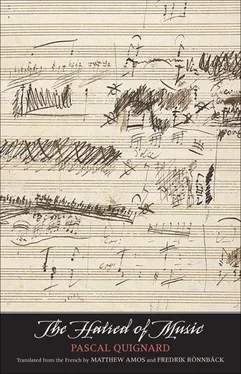Romans describe the terrifying flapping, the roaring of the linea pennis in the wind, forming the access corridor trapping and forcing the beasts in the direction of the nets.
The terrificatio is no longer exactly the formido . We believe that a branchy man smeared with vermilion will pass as human and hope that it will instill fear. It is no longer a question of boars and stags. We are determined to keep out curious little animals who love seeds and who, with the help of their former fins covered in feathers, are able to move about in the air and whom we call birds.
In the well of the small, dark cave that is located near Montignac, near the dead desirous man, there is a stick driven into the ground surmounted by a bird’s head.
An inao. A terrificatio.

From the beginning of book I of the Consolatio , as Boethius, in 524, imprisoned in the tower in Pavia, enumerates all of the senators who abandoned him to distress and to death, the philosopher evokes his terror , his dejection, shows the chain that is fixed to his neck, describes the maeror that, diminishing and blunting his own capacity for thought, is altering his perception of what he is and the evaluation of what he is worth. In two gripping verses, Boethius shows the unintelligible paralysis in which pain imprisons its victim and evokes the obedient stupor in which tyranny imprisons man. He compares these two enigmatic lethargus , which are far from characteristic of humans since they derive from animal fascination.
— Sed te , the beautiful and immense woman, whom he has named Philosophia and who stands over his bed, suddenly interrupts him, stupor oppressit .
“But stupor oppresses you as well.”
It is then blindly, without any of his volumen within reach, that Boethius, as he endeavors to analyze the gradual establishment of Theodoric’s tyrannical regime, constructs for the entire Middle Ages the mythical figure of the tyrant. Yokes of imagines become dialectical couples before they transform themselves into emblematic pairs: Zeno and Nearchus, Cassius and Caligula, Seneca and Nero, Papinian and Caracalla. Finally himself, Anicius Torquatus Boethius, against Flavius Theodoricus Rex.

Scarecrows: terrificatio .

Dread. Inspiring fear. Perspiration from fear, horripilation, pallor, immobilization, shitting. Shuddering, shivering, trembling, doubling over. To terror I prefer horror. The word is hardly more precise, but it happens to emphasize disgust and show hatred. What world do we imagine when we act surprised at the sight of terror mixed with the predation of power? Can we separate love from terror in its means, in its manifestations and in its end? (Anguish, trembling, anorexia, pallor, diarrhea, arrhythmia, death rattle.) Can beauty be cleansed of terror? (Stupefying, silencing, keeping at bay.) Do we know a god free of terror ? The hand of the gentlest, the most Greuzian, the most Diderotian father is larger than his son’s head and, when he stands up, the child sees nothing but knees. Where are the hands that were given as the whitest? At the end of Erzsébet Báthory’s arms in Csejte, in the snow, on a spur of the Lesser Carpathians, in November 1609. Richelieu replied to Father Mulot, who asked him how many Masses had to be said to pull a soul out of purgatory: as many as it would take snowballs to heat an oven. Terror is in the depths of my heart. It is the depths of my heart. To restrict it I trust only those who see themselves as completely soiled at least by the sound that announces it. This sound preceded my birth, the inspiration of air and the contact of day. Our ears were pricked and terrorized by unintelligible signs under the partition of skin even before our lungs functioned and allowed us to scream.

Man re-creates the partition of a woman’s belly in drum skins, which are the cleaned skins of animals that are hailed by the sound of their horns.

Reconciliation, peace, divinity, goodness, purity, fullness, civilization, brotherhood, equality, immortality, justice, and they would slap their hands loudly against their thighs.

Everything is covered in blood related to sound.

War, the State, art, religions, earthquakes, epidemics, animals, mothers, fathers, factions, coercion, suffering, disease, language, hearing sounds, obeying. I brace myself against them.
Getting away from the gang; out of the corner of one eye watching out for the oh-so-funny and unexpected buckets of cold water over every door that swings open, out of the corner of the other the gaping mouths of wild beasts; fleeing at full speed whenever I catch sight of bodies that have any sort of faith in any sort of institution or being; fleeing the feebleminded and atrocious conviviality of our time; building a lesser dependency within a small network of polite expressions,
of harmonies between grammatical tenses and musical instruments,
of small softer regions of the skin,
of certain berries, of certain flowers,
of rooms, of books and of friends,
this is to what my head and my body devote the essential part of their reciprocal, always unadjusted, finally almost rhythmic times. This was what the emperors and interior ministers of two millennia ago used to shame the disciples of Epicurus and Lucretius. Virgil’s sorrow. Vergilius’s sorrow on the road from Pietole, on the banks of the Mincio, in Mantua, in Cremona, even in Milan — the author of the Bucolics , the disciple of Siro, the Vergilius of friendship and flute duos that stretch the lips and make the cheeks swell.
Menalcus turned to Mopsus and said: “Let us read to each other what we are writing.”
The Vergilius of Rome exempted from taxes, ambitious, domestic, white-fingered, three fingers clenched around a stylus that crosses out Cornelius Gallus’s name; reading aloud while dining at Octavian’s; reading aloud while dining at Maecenas’s.
Vergilius ashamed. For whom silence was suddenly a shore.
Finally the Publius Vergilius Maro on September 21, 19 before the era, sick with malaria, bedridden, sweating in a room in Brindisi, shivering with cold despite the late summer heat and the fire in the brazier that spits its flames in the middle of the room, pleading while dying that the boxwood tablets and already transcribed cantos of the Aeneid be gathered from the chests in the room and retrieved from the homes of his closest friends so that he might personally burn them all.
His hand trembled. His lips trembled as they pleaded. Drops of sweat trembled on his face that begged for his books.
And those who surrounded him in his agony, not moving, refusing him both his tablets and his scrolls, impassive, Octavianists, weary of his cries, immobile.

Horace ages. Quintus Horatius Flaccus reflects on the course of his life. Straightaway he considers it justified because he will have been “dear to his friends.” Carus amicis . These are the words that Horace inscribes with a trembling stylus.
Читать дальше













